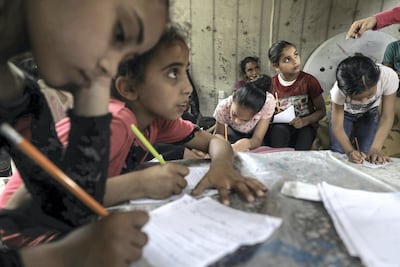Boris Johnson challenged the world's richest countries to prioritise the education of girls at the G7 opening session in Cornwall on Friday.
The British Prime Minister said a funding summit dedicated to building back schools and other educational infrastructure, particularly for girls, would be held next month.
To show the UK commitment to the cause, Mr Johnson pledged £430 million ($608m) of new development aid for the World Bank-backed Global Partnership for Education (GPE), which provides funds for schools across developing nations.
“It is a source of international shame that every day around the world children bursting with potential are denied the chance to become titans of industry, scientific pioneers or leaders in any field, purely because they are female, their parents’ income or the place they were born," Mr Johnson told his fellow leaders.
British officials hosting the conference said quality education for girls was central to the effort to recover from the Covid-19 pandemic.
With 1.6 billion children around the world out of school at the height of the global lockdowns, the pandemic worsened the problems preventing girls from accessing schools, particularly issues of poverty, child marriage and domestic violence.
Experts in developing world education welcomed the announcement but said it wasn't sufficient to close over the widening gap.
"The commitment to global education from the UK government is a welcome first step in the right direction - but doesn't go far enough, especially as it comes against a backdrop of savage cuts to the international aid budget which will push the world's poorest people further to the margins," said Sarah Brown, the chair of the global charity Theirworld. "The funding is a drop in the ocean compared to the scale of the global education crisis - with these three pledges representing just 0.33% of the $75 billion per year needed from donors to close the global education funding gap."
According to a Theirworld report the global education need is $75 billion a year to meet the United Nations’ goal of quality education for every child by 2030. Current aid to education is just $16 billion a year, and is projected to fall, leaving an education funding gap of at least $59 billion a year, it said.
The GPE claims to have contributed to a massive expansion of primary and lower secondary schooling, getting 160 million more children into classrooms since it was founded in 2002. "In countries where GPE works the number of girls enrolling in school has increased by 65 per cent," a statement said.

The July Global Education Summit is co-hosted by Kenya and has a target of raising $5 billion to support the work of the GPE over the next five years. The G7 leaders endorsed an agreement among the foreign ministers in May to get 40 million more girls into school and 20 million more girls reading by the age of 10 in the next five years.
Officials said the European Commission pledged €700m and Italy offered €25m ($30m) before the summit.
The officials said that ultimately every girl in the world should received 12 years of quality education. There is a generational impact of improving access as a child whose mother can read is twice as likely to go to school themselves and 50 per cent more likely to be immunised. With just one additional school year, a woman’s earnings can increase by a fifth, the statement added.
With the additional resources it seeks, the GPE hopes to train 2.2 million more teachers, build 78,000 new classrooms and buy 512 million textbooks.

A British government panel, the Gender Equality Advisory Council, issued a report for the G7 meeting which backed the drive to support education for girls.
"A pandemic response and recovery that takes account of the needs of women and girls, and tracks the effect of recovery initiatives on men and women, taking into account factors such as age, income, disability and ethnicity," the report recommended.
"At least 12 years of gender-transformative education for all, building on G7 Foreign and Development Ministers’ commitments on girls’ education and, domestically, supporting schools to implement gender-responsive policies to benefit girls’ physical and mental wellbeing."


